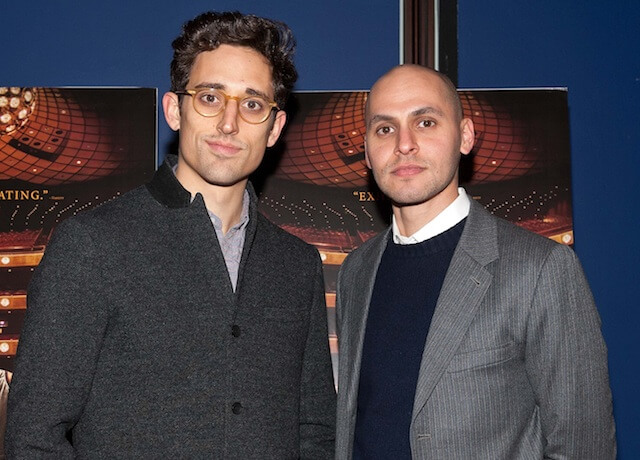Justin Peck had no idea that “Ballet 422” would be a feature-length documentary about him. Directed by Jody Lee Lipes — a skilled cinematographer who shot “Martha Marcy May Marlene” and Lena Dunham’s “Tiny Furniture” — the film traces the creation of a dance Peck, a corps member of the New York City Ballet, choreographed for the prestigious institution. But it doesn’t pry into his life, doesn’t have narration or interviews and features none of the theatrics and wounded egos common to ballet cinema. That, of course, was wholly intentional. Lipes and Peck sat down to talk to Metro about what they did and didn’t want the film to be. Was Peck reluctant to let filmmakers follow him around when he was really busy?: “I didn’t feel nervous about it, because at the time it wasn’t brought to me as this huge feature-length documentary,” Peck admits. “It was more like ‘This filmmaker wants to come in and shoot some of the process of you making the ballet. Are you OK with that?’” He says Lipes and crew were low-key and incognito as they filmed him, to the point where he was shocked when they wound up with a 70-minute final product. “I was shocked. I was like, ‘How did you do that? How did that happen?’” Lipes himself wasn’t sure at first what the film would become: “The way I look at any verite project,” Lipes says, referring to the style of fly-on-the-wall, purely observational documentary filmmaking, “is you have to see how it goes. I said at the start that I’d come to rehearsal and shoot, and if [Peck] felt it wasn’t the right thing, if it was inhibiting him, he’d tell me and I’d stop. We thought it might be a short, but we kept going and kept cutting and realized it would be more substantial than that. You let the story detail how long the film will be.” What it isn’t: Lipes is proud the film is low-key and drama-free. “I don’t think it’s a film about conflict,” Lipes says. “It’s a process film: This is what happens, this is what happens, this is what happens. It’s not about fighting. It’s problem, decision, problem, decision, problem, decision. It is what it is, at least for this particular guy and this particular dance in this particular company.” You can’t shoot a tripod in a dance space: Lipes shot his first documentary, 2009’s “Brock Enright: Good Times Will Never be the Same,” with the camera locked down on a tripod. Even if he wanted to do the same here, that would have been impossible. “If you shoot dance in a rehearsal space, you can’t use a tripod, because if you do it shakes, because everyone’s dancing on the floor,” Lipes explains. “The floor is really malleable. It’s called ‘dance floor.’” Justin’s favorite ballet film: He goes with “West Side Story,” directed by Robert Wise and its choreographer, Jerome Robbins. “It’s a rare occurrence where the whole idea behind the production was conceived by its choreographer,” Peck says. Lipes on Frederick Wiseman: Lipes’ favorite dance films, meanwhile, are the ballet documentaries by legendary documentarian Frederick Wiseman, including “Ballet” and “La Danse,” about the American Ballet Theatre and the Paris Opera Ballet, respectively. “When I make a documentary he’s the biggest influence on me,” Lipes says of the filmmaker. “The thing I love about his movies are they’re about something on the surface, but underneath there’s a whole other thing they’re about. I don’t think he would say that out loud, but it’s clear to me. Someone may see “Central Park” and think it’s about Central Park. But it’s not about Central Park.” Documentaries as more than journalism: Also like Wiseman, Lipes sees non-fiction filmmaking as about more than reporting facts. “I think documentaries can be used as a tool to explore or challenge social issues. And that’s great. But I think documentary films get confused with what they’re about. People think a good documentary is about a good topic. I think a good documentary is about a good topic and it’s made well,” Lipes explains. “People think there’s more room for a documentary filmmaker to be sloppy; it’s OK because it’s a documentary. I don’t think that’s OK.” Shooting comedy: Lipes recently shot Judd Apatow’s next film, the Amy Schumer-led “Trainwreck,” which will no doubt bring visual craft to someone whose films tend to look plain. But he’s aware comedies can’t be too good looking. “Sometimes when comedies are really well-made, people don’t think of them as comedies,” Lipes says. “It’s not necessarily what the focus is, the visual part. But with any kind of film, all of the elements need to work together. A truly great comedy needs to have visual components too, even if the visual component is people standing against a white wall.” And shooting comedy is just something to add to his repertoire. “It’s valuable to do different kinds of work. It helps you get better. ‘Trainwreck’ is probably a better movie visually because I made [Ballet 422].” How Peck and his colleagues have reacted to the film: “I think it’s an honest depiction of the environment, and also what it takes to make a ballet from start to finish,” Peck says of a film that features no ego or in-fighting. “If it was twisted into some tall tale that wasn’t at all what happened, I think people would have been pissed off.” Follow Matt Prigge on Twitter @mattprigge
Interview: Jody Lee Lipes and Justin Peck on ‘Ballet 422’

Getty Images

















